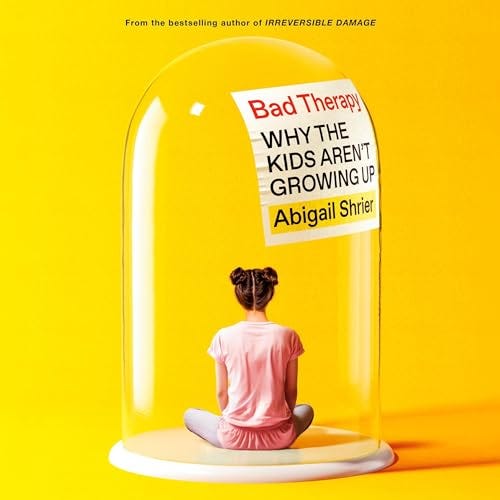Your Kids are Not Hurting (and Self-Esteem is Not the Answer)
Is "Compassion" Destroying our Children?

Abigail Shrier’s book Bad Therapy: Why the Kids Aren't Growing Up is a must-read for anyone swimming in our current culture. A thorough investigative journalist, Shrier chronicles the rise of “gentle” parenting and therapeutic-based education, which is rampant in homes and schools across the country.
Shrier lists story after story demonstrating how schools have basically become therapy centers in which school counselors hold all the authority, often completely shutting parents out. Math is a great place to talk about your feelings. Any slight deviation from normalcy and kids are slapped with a condition or a diagnosis and often then given drugs.
Therapy is not necessarily bad, and Shrier is careful to point that out. Sometimes, it is truly necessary and helpful. The problem is when we view children ONLY through therapeutic lenses and hyper-elevate therapeutic practices.
When we see children as a problem to be fixed, the only centralized narrative is that kids are hurt and need help or medication. Whereas kids used to identify themselves, perhaps by the type of activities they were involved in—sports, drama, or music—kids today often identify themselves on social media or with their friends according to their “conditions.”
The verdict? The truly sad thing is that gentle parenting and therapeutic-based education have created the most depressed, anxious, and suicidal generation ever witnessed in human history. Record numbers of Gen Z kids can’t even leave home and attempt to get their own life. They literally can’t grow up.
“The self can’t be both the problem and the solution.”
— Allie Beth Stuckey
A hyper-focus on feelings, as detailed by Shrier, actually makes the problem much worse! To paraphrase a quote from Jordon Peterson, a focus on self is synonymous with depression and anxiety. They are one and the same.
Of course, kids need nurturing. It’s called being a mom.
But they also need hard knocks. It’s called growing up.
The best way to capture what this looks like is through good stories like The Horse and His Boy by C. S. Lewis. The protagonist, Shasta, had a very difficult upbringing, and that is certainly acknowledged. But the answer was not to give him a mental condition, a therapy support animal, and some drugs. The answer was stiff trials that made him grow and mature. He just needed to single-handedly run down a lion or two like David.
Some might assume that if you don’t adopt gentle parenting practices, the only other option is a harsh and authoritative approach. Stick around or subscribe to my Substack, and I’ll hit that question soon.
Stories give kids a road map for what this kind of maturity looks like without overburdening them with heavy moral teaching.




Dig it!
Hard Men podcast did a podcast recently about this book. I appreciated their thoughts and was thankful to see you talking about it as well. We are swimming in a world of feelings and “let’s talk about it.” I’m grateful to see people speaking against this.